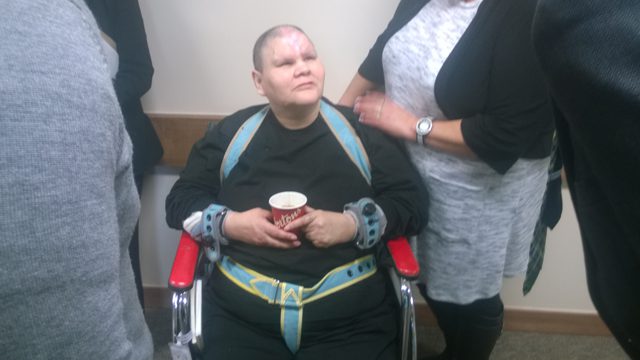When Marlene Carter was being wheeled out of the Brockville Mental Health Centre in Ontario for the last time in April staff applauded.
The mentally ill Cree woman’s time there hadn’t gone as planned, to put it mildly.
But Carter, 45, may be heading right back there in January if the Attorney General of Saskatchewan doesn’t make a decision that many say is taking too long.
Gordon Wyant needs to accept Carter back under his jurisdiction and soon, as her federal sentence expires near the end of January.
“It’s just a matter of Saskatchewan coming around and provinding their consent to a transfer,” said Joe Wright, legal counsel for the Ontario Review Board (ORB). “In a sense, we’re a little bit dismayed that it seems to be taking a little longer than it should.”
See also: Cree woman serving a death sentence unless Trudeau government steps in
This is where things get a bit complicated.
Carter is already in Saskatchewan – at the Regional Psychiatric Centre (RPC) in Saskatoon, but she is partly under the authority of Ontario.
Carter has been at RPC since she was removed from Brockville facility.
While in Brockville, Carter was convicted of assaulting nursing staff and was found not criminally responsible (NCR) placing her also under the authority of the ORB, which is in charge of NCR cases in Ontario. She then became a duo-status offender.
The original criminal sentence stems from time when she was at RPC before being sent to Brockville in the summer of 2014.
Her time at RPC, before the transfer to Brockville, has been well documented. Carter was kept in restraints for more than two years as she was prone to hurt herself by smashing her face on hard surfaces and assaulting staff and fellow inmates.
Saskatchewan also failed to have her declared a dangerous offender.
So, when she was sent to Brockville it was believed she would benefit from a new specialized program for mentally-ill female inmates. The doctor who ran the program said it never really got off the ground.
That story can be read here: How the federal government failed Marlene Carter
It was decided she may be better served moving back to Saskatchewan to be closer to her family as she is a member of the Onion Lake First Nation – her sisters, brother and step-mother all live in the area.
Her step-mother Annabelle Knight said Carter calls her “almost every day” and has been able to reconnect with her sons who she hadn’t seen in years.
In sending her back, the ORB requested that Carter be placed under the authority of the Saskatchewan Review Board, removing ORB’s responsibility.
That decision can only be made by Saskatchewan’s attorney general who so far hasn’t done so with time running out said Wright.
APTN spoke to one of Wyant’s spokespeople asking what the delay is, but they did not respond before deadline.
If Wyant doesn’t agree to take her back, Carter will be sent back to Ontario and possibly the Brockville institution.

“Marlene does not want to be sent back to Ontario,” said her Brockville lawyer Michael O’Shaughnessy who is still representing Carter while the decision is made.
O’Shaughnessy said her doctor in Brockville also doesn’t want her returned and believes she is best suited in a hospital in Saskatchewan closer to loved ones.
But a hospital in Saskatchewan can’t admit her until Wyant makes a decision.
Carter hasn’t received any new charges at RPC, but APTN was told she has self-harmed again.
Kim Pate, who was recently appointed the Senate, has advocated on Carter’s behalf for years as executive director of the Elizabeth Fry Society.
Pate recently paid a visit to Carter and said the decision should not have been left this late.
“We have been trying to encourage, urge and push people to make a decision far in advance of this. There are many, many questions as to why now we are literally at the 11th second of the 11th hour desperately running around trying to find some options,” she said.
Pate said months ago there were talks among officials on even how to re-integrate Carter back in the community.
“There are many of us who believe, if the resources are made available in the community she can, and should, be in the community with supportive housing and supports around her,” said Pate.
For now, they’re just trying to find her a hospital and keep her close to home.









